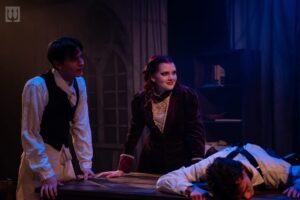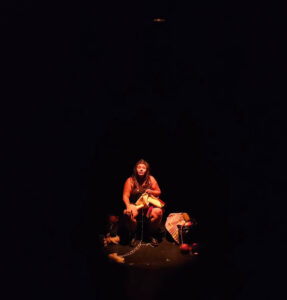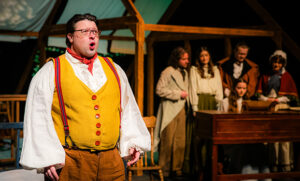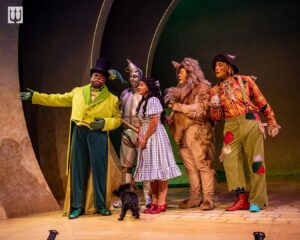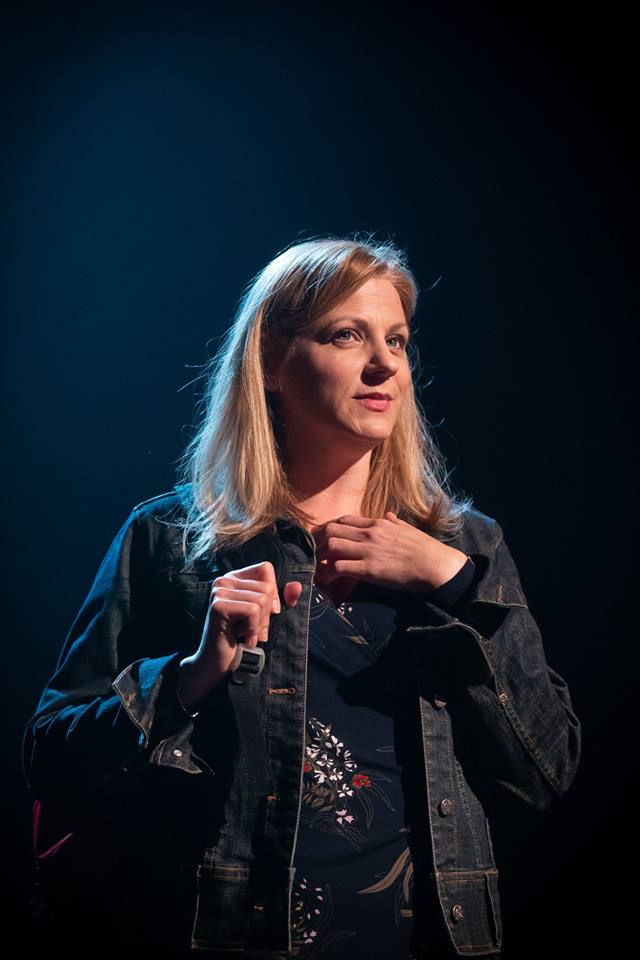
As I sat at the Highland Arts Theatre watching Hannah Moscovitch’s play, Bunny, I wondered if I had ever seen a character like Sorrell onstage before. When it comes to sex and women in stories I’m used to the sex that comes with falling in love, I’m used to the sex that comes with being the villain or the cautionary tale, I’m used to the sexual assault and the rape I see where women are usually the victims, but what about a woman who has sex with whoever she wants whenever she wants to? What happens when we’re not encouraged to immediately judge, or even to worry about that woman?
Sorrell begins the play in a canoe on a Canadian lake with Angel. She “shouldn’t” be there. Angel is much younger than she is, he is friends with her niece. Her niece has a crush on him. He has been hitting on Sorrell since they met. She addresses the audience, speaking in the third person, telling us how she has come to be in this canoe during what, it is later revealed, is a difficult time of transition for her.
Sorell was raised by two anti-capitalists, professors in a small Ontario University town, and from childhood has a deep love of Victorian literature, especially the work of George Eliot. This did not make her easily accessible to her peers, so she was largely left in isolation at school. This meant that Sorrell was never socialized to the rules that girls usually learn about how sex is tied to their social status and to what “kind” of woman they are perceived as growing up to be. Once puberty bloomed, Sorrell became a “hot dork” and an enigma. She kissed nineteen boys and won all the science awards. What kind of woman did that make her? She was quickly both shunned and loathed by all the girls in her class because they couldn’t figure out the answer.
In University Sorrell continues to struggle with feeling like a freak for enjoying sex without needing the emotional attachments of love or relationships to justify it. She also thrives in school and meets her best friend Maggie, who gives her the nickname “Bunny.” Since she has never had a friend before Sorrell finds connecting to Maggie difficult and scary, but Maggie is patient and supportive and loving and she learns to read between Sorrell’s lines. Sorrell then meets Maggie’s brother, Carol, and she recognizes him as one of the guys women are “supposed” to marry, and in an attempt to be “normal,” to do what she is “supposed” to do, to make the “right choice,” and to be an “adult,” she marries him. Many years pass and time and stress then brings her to the canoe with Angel.
Hannah Moscovitch constructs this play in such an interesting way. It feels like a one woman show, but it has a cast of seven. Sorell’s husband and former partners exist in the periphery, coming in and out of her memories, so we get a strong enough sense of what the dynamic is in each one, but the play remains rooted in Sorrell and the conflict that exists inside of her. The writing is sharply funny, it is raw and unafraid to show awkwardness (in sex and otherwise), and it’s poignant and thought provoking in both what is said and what isn’t said. Richie Wilcox directs the play in a way that layers awkwardness over sexiness over warmth as the play moves its focus from Sorrell’s lust and desire toward her deep feelings of love.
The cast all give beautiful performances. Graeme McNabb is full of boyish charm as Justin, Sorrell’s first boyfriend, Ciarán MacGillivray gives a nuanced portrayal of a very conflicted professor, Wesley J. Colford plays Carol and is also adept at giving a lot of depth and complexity to a character who has very little stage time. Zion Stephens plays Sorrell and Carol’s niece Lola who is sweetness incarnate. Steven Peters plays Angel, who also manages to play a nice duality in both how he connects with Lola versus the way he pursues Sorrell. Robyn Lee Seale plays Maggie, and she gives a beautiful performance of a warmhearted, emotionally generous woman who helps Sorrell learn how to find intimacy and encourages her to be kinder to herself.
Francine Deschepper shines brightly as Sorrell, a role that has her beginning and ending the play as a married mother of teenagers, and then seamlessly going back in time to adolescence and growing through University age toward the present again. The play hinges on the audience liking Sorrell and connecting with her, regardless of whether or not we agree with all the choices she makes. Deschepper succeeds beautifully in making her a complex, multifaceted, human being who can be strong and vulnerable, awkward and brilliant, funny and heartbreaking, smart and dumb, sometimes all at the same time, like all of us.
This play debuted at the Stratford Festival in 2016 and its Ontarian backdrop of privilege, academia and wealth informs who Sorrell grows to become, but doesn’t limit the play’s ability to reach a much broader audience. I could feel how much the play was resonating with the Wednesday audience in Sydney. How much has changed for women in the ways they express their sexuality, or talk about their lust or desire since George Elliot was writing her novels in the 1860s? What role do women play in being the gatekeepers for other women’s relationships to sex? How often is it assumed that women always want an emotional connection with their sexual partners? How often are we encouraged and conditioned to worry about the woman in a sexual situation? This play raises questions that I don’t think get asked (or answered) enough, and it does so in a way that is compassionate, intelligent, funny, self-deprecating, and ultimately celebrates the power of women loving each other through each other’s flaws and life’s penchant to be messy, unfair, heartbreaking, and complicated.
If you live in the Cape Breton Regional Municipality, I encourage you to hurry and get your tickets to the last two performances of this play at the Highland Arts Theatre. If you live in Antigonish, New Glasgow, Halifax, Truro, Pictou, Port Hawkesbury, Mabou, Big Pond, or anywhere in between I encourage you to get in your cars, arrange a carpool, buy a bus ticket, whatever you need to do to go to Sydney for this one. It’s well worth a five hour drive.
Hannah Moscovitch’s Bunny plays at the Highland Arts Theatre (40 Bentinck Street) April 13th and 14th at 8:00pm. For tickets visit THIS WEBSITE or call 902.565.3637 or visit the Box Office at 40 Bentinck Street.
You can follow The Highland Arts Theatre on Facebook. Twitter and Instagram (@highlandartstheatreofficial).

